Many Outlander fans can lose focus and get their knickers in a twist arguing historical context in their favorite series. Here we take a look at presentism pitfalls in Outlander.
What draws people to historical fiction? I can tell you what draws me. I love feeling transported to a different time and immersed in that world. I want to experience history through characters I love. I want to understand their daily life with all its struggles, challenges and simple joys. What dangers did they face, and how did they survive? What did they value and why? What were their notions of morality and honor? A journey to the past can enlighten the present and guide the future.
Is this true for you as well? If so, you may be setting up a roadblock that keeps you from that journey. It’s called presentism, and it prevents you from truly “feeling transported to a different time and immersed in that world.” You can’t because you don’t allow your mind to let go of the present.
Here’s what Diana Gabaldon says about presentism:
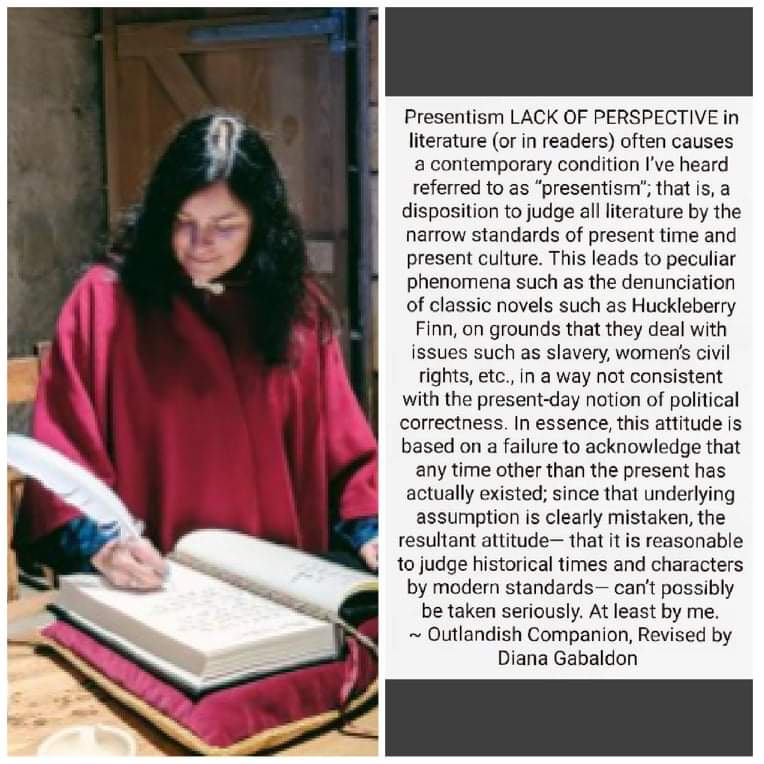
Presentism means judging past actions by today’s standards, maintaining an unrealistic adherence to present-day attitudes, or the tendency to interpret past events in terms of modern values and concepts.
Readers and viewers are not the only ones who can fall into this trap; authors and scriptwriters can as well. A fearful writer might sugar coat actions they don’t like (or think their audience won’t embrace). A biased writer may purposefully skew reader/viewer perception toward a current cultural norm or political statement. Even Outlander writers often give a current “cleanse” to the book material. (More on this later). Presentism manifests itself in several ways and often obstructs your ability to truly appreciate this genre..
Even Jamie tried to make us understand this concept:
At this point, Jamie didn’t know Claire was from the future, but he knew she was different. In his culture, women didn’t defy men. They didn’t mouth off and challenge them. Women depended on men for their survival and protection, and they deferred to a man’s word. In that time and culture, most women did not feel themselves entitled to have their own opinion (at least not spoken aloud in that manner). She obviously came from some place that differed vastly from his own.
Jamie addresses this again in “The Reckoning” when he says to Claire, “You come from a place where things are easier, I think… where it’s no a matter of life and death if you disobey orders or take matters into your own hands. But it’s the hard truth in places and times like these that a light action can have very serious consequences.”

Jamie continually warns Claire (and eventually Bree) that the norms and rules of their own time do not apply in his world. They MUST understand and adapt, or face severe danger and disappointment.
Diana often shows the reverse as well. Claire, Bree and Roger often leave Jamie and Ian awestruck, amazed, horrified, amused, shocked, appalled and intrigued with words and actions that seem commonplace to us. (For example, poor Claire constantly tries to convince those she loves that germs exist and cause sickness, and vegetables contain vitamins that can prevent it. Her 18th century kin scoff at the idea that an invisible “wee beastie” could possibly kill them … how preposterous! However, they know better than to argue too much.)
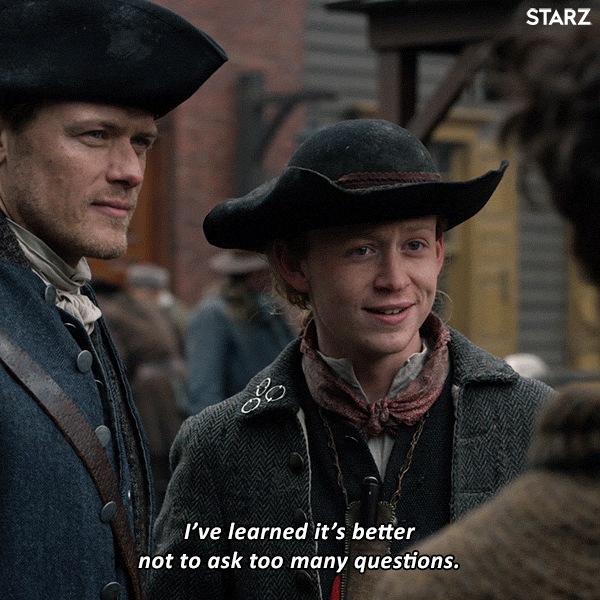
And who could forget Jamie’s reaction to his bikini-clad daughter?
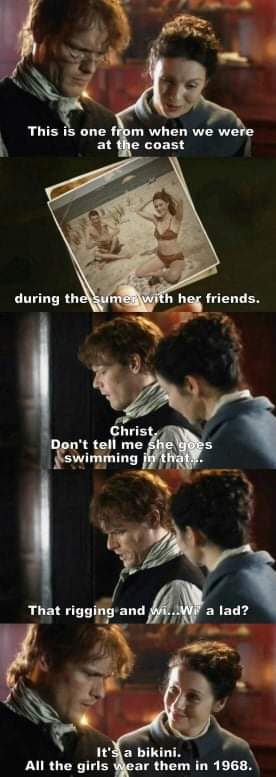
Both Diana and the showrunners use these moments to constantly remind us as well. Two hundred years of progress separate these characters from each other, and 250-275 years separate them from all of us today. (After all, Jamie turned 298 years old in May!) None of these characters — even Frank, Claire, Brianna and Roger — are “modern.” We often forget that their “time” is still historical. (Claire turned 101 in October!). The 1940s and 1960s presented vastly different societal norms, taboos and challenges from today.
So, you are probably saying, “Well, no kidding…Tell me something I don’t know. That’s one of the reasons we love this story.”
That may be true, but I think many fail to truly embrace the concept. I often see some fans judge these characters based on 21st century culture and norms, especially those who have only watched the show (although book fans certainly are guilty as well). They observe rather than immerse. They view through the eyes of the ideal instead of the real. This is the heart of “presentism” and often impairs the true joy of historical fiction.
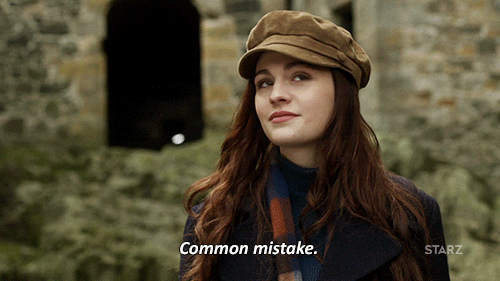
A WEE BIT ABOUT THE HISTORICAL FICTION GENRE
In its broadest terms, historical fiction is a fictional story set in the past. Some stories lean more on the fiction and less on the historical. These include few, if any, real historical people or incidences. The period is for setting purposes only and not integral to the plot.
Others lean much harder into the “historical” part. Actual events are experienced through the characters and vital to the plot. The writer will also weave historical characters through the story interacting with the fictional characters. Outlander falls into this second category. When done well (as Diana does with the Outlander series), the fictional characters can feel very real. Maybe that’s one reason we book fans always want to protect them!
When we read or watch historical fiction, three time periods influence our perception:
- The time of the setting(s)
- The time the author created it, and
- The time we are consuming it (reading or watching).
Today’s norms are different than post war 1940s, turbulent 1960s and the 18th century. Our knowledge and perspectives may also differ depending our own country of origin, its current climate and history. However, we’ve also seen norms change quite a bit since the 1987 culture when Diana started writing this series. So, be conscious of all three, but focus on the first.
Accuracy Helps
Writing well-crafted historical fiction can be a challenge. Even for a stand-alone novel, it’s no easy task to weave historical people and events seamlessly and plausibly through a plot with fictional characters, while maintaining historical accuracy.
So, creating an intricate yet expansive saga like the Outlander series accurately requires tremendous research. Between the Outlander and Lord John series, Diana explores quite a staggering array of historical events, people and cultures.
Her research library now holds over 2300 titles and counting. The defining elements of historical fiction genre include characters, language, settings, culture, customs, plot, themes and world building. Topics include Native American rituals, torture, Celtic traditions, military strategy, nobility, Scottish legends, Free Masonry, sadism, shamanism, herbal medicine, biographies etc.. and that just barely scratches the surface.
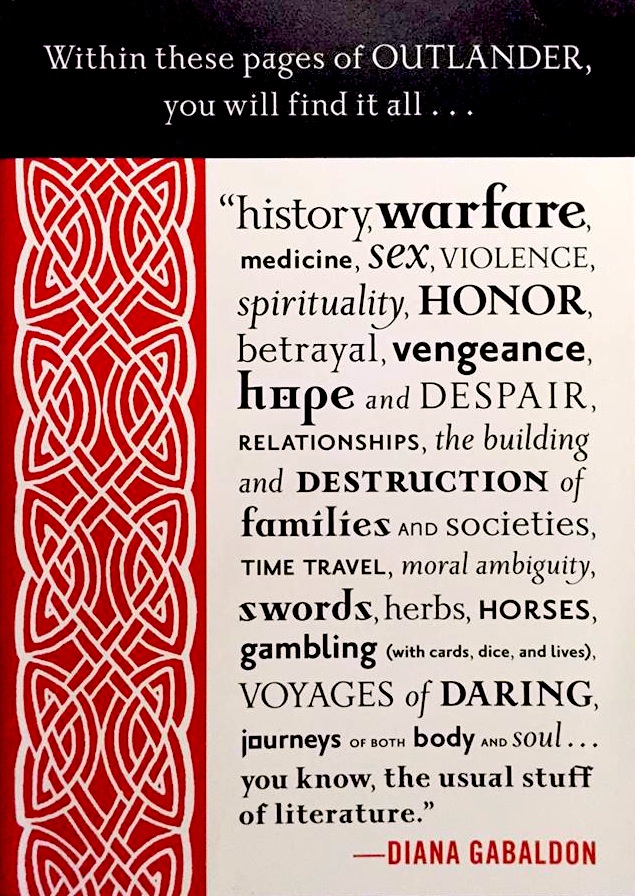
The rich detail and authenticity woven through each page makes this story immersive, educational, engaging and addictive. It is also historically and culturally accurate (with all its good, bad and ugly).
In addition to the big historical movements, Diana grafts many factual minor elements and incidents into the story. This immerses the reader (viewer) into the world, and I love discovering them.
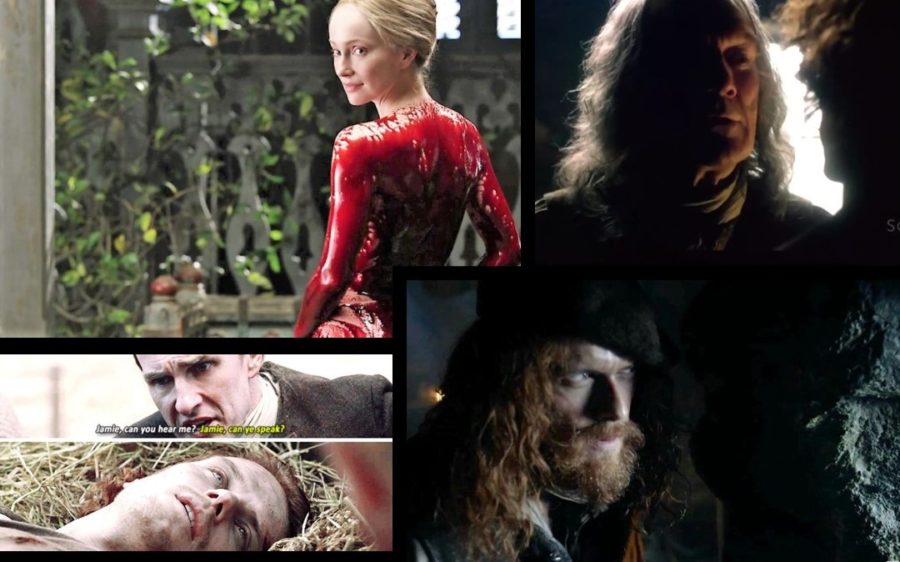
An actual officer in the Lovat regiment, James Fraser, solely escaped execution after being trapped with 18 wounded men in a nearby farmhouse after Culloden. The Dunbonnet story is a real legend. On Jamaica, you can tour Rose Hall, once owned by a witch. A journal account and illustration of a slave impaled alive on a raised hook at a plantation inspired the story of Rufus at River Run. Lord Lovat did in fact have a reputation of double dealing, forced marriages and fathered bastards.
To date, over 300 true historical figures, major and minor, appear in this book series. Diana also integrates daily living customs, procedures, traditions, native species and beliefs through the characters’ lives as well as their personal histories. The showrunners also conduct extensive research to visually represent the period through content, sets and costumes. These elements saturate our fictional characters and story to build a world that feels very real and transports us.
Historical Perspective
But it’s not just about facts — it’s about perspective. Diana often gives readers a new way to see something that possibly differs from the historical record, which can be slanted depending on who is writing it and why. An old newspaper article may have a politically skewed purpose. Textbooks may want to put their country of origin in the best light. Sometimes historical authors used the past to validate their own present opinions. This demonstrates presentism because it emphasizes validating facts, ignores contrary ones, and skews the picture. As Brianna says toward the end of this clip… History can’t always be trusted.
So, Diana gleans from multiple sources. She leans heavily on firsthand accounts, letters and journals, which also capture the language, culture and style of the period. She filters all of this though historical record (from multiple sides) to gain a true picture.
Diana has described her work as a pattern created by a kaleidoscope (colored fragments in a tube, turned to form a pleasing picture from the reflection of three mirrors). Historical reality is just the first mirror that creates what we see. It’s just the beginning.
Character Perspective
The second mirror of this kaleidoscope reflects the characters in the story — who they are, their motivations and their personal histories. Diana is brutally honest about her characters and their thoughts or actions in every moment (good or bad). Remember this when you start to feel a modern knee jerk reaction.
She embodies the soul of each character with everything they think, feel and believe based on their own culture, perspective, personal history, genetics, knowledge, fears and values. She doesn’t write FOR the audience and how they will react. These books are character driven, not plot driven or reader driven. She doesn’t think, “Well even though this is what Jamie would actually think in this situation, I can’t say that because today’s PC culture would think he is a racist.” OH NO… not Herself. She always remains true to that character at that time, in that circumstance. Period.
Even in observations and exposition, she writes information the way the character would perceive it, the way they would describe it, noting what they would deem important and leaving out what they would think didn’t matter. You hear through each character’s perspective with a clear difference in tone, language, rationalization, fears, perception, sarcasm, attitude and conclusions. There’s no objective POV. This gives Diana’s characters extreme consistency and definition. They become people we intimately know. Why do you think we cringe when the show writers mischaracterize them?
Presentism in Action
Sometimes this brutal honesty contrasts against our own social norms, values and ideals. I can almost guarantee it will at some point. My own values and beliefs have evolved and progressed in the span of my own lifetime. So, surely they will not always match the values, norms, actions and reactions of our favorite characters who live 250 years in the past!
Rather than process these conflicts in the context of time, circumstance, character as well as the knowledge, norms and limitations of the period, some people opt for 21st century judgment. They attach modern labels that didn’t even exist as a concept in the 18th century. Their current progressive sensibilities become offended.
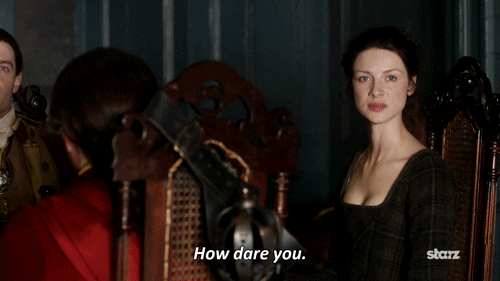
Then fandom kerfuffle swells with shocked exclamations, “What a misogynist!” “How sexist!” “They’re excusing spousal abuse” “That’s marital rape. She didn’t give informed consent” “Oh great, the ‘white savior’ syndrome” “How dare he bring up her virginity?!” “That’s racist” (mind you, the definition of what is considered “racist” has changed in just the last 20 years). And my personal favorite: “That’s such a backward way of thinking!” Um, yes, yes it is. And?
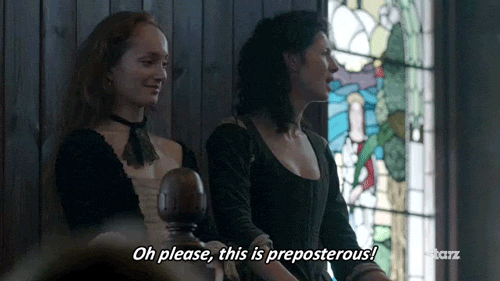
Don’t color history with the lens of the present. You miss so much when you do. Remember, societal norms, beliefs, laws, knowledge, obstacles, industry, communication, law enforcement (thus legal protection), medicine and customs have all changed over time.
Who knows how we will appear to people looking back on us in 200 years? “Judge not, lest ye be judged.” Aye?
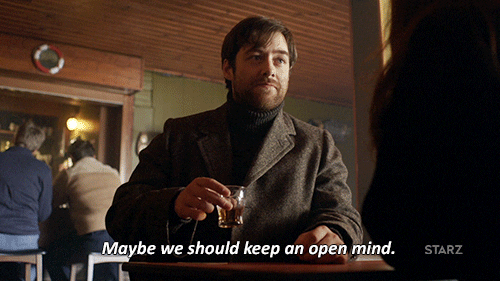
For example, women’s rights have changed dramatically even over the last 100 years. During the 18th century women were completely dependent and subject to their husbands with no real legal rights of their own. They went from their father’s hearth to their husband’s. Without a man or family, their choices for survival were slim. Today, we have five women in the U.S. Presidential race. Do you think George Washington ever envisioned a future female President?
You will roadblock your journey to the 18th century if you try to judge these characters by today’s values of feminism, the “me too“ movement and “know your value” philosophy. You will be disappointed.
Other examples include slavery, corporal punishment, hygiene (#PeeGate anyone?), religious beliefs, homosexuality etc. Every character, even the King of All Men, will fall short of your modern ideals at some point because they are not of this time. You must see them in the context of their time and experience.
Now, reacting to the action itself is a different thing.
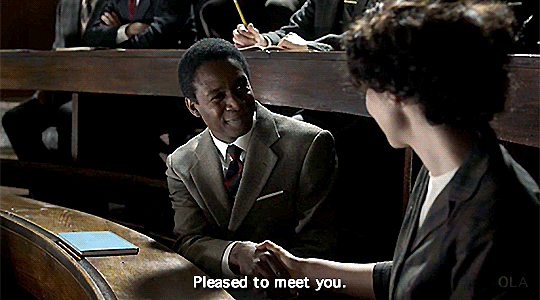
Consider the scene where Claire starts medical school, and she and Joe Abernathy get ignored by their classmates. We should maybe feel sadness about how women and people of color were treated at that time. We should feel upset for Claire and Joe. We should be inspired even by the extra challenge they both faced and conquered. However, the people in the class were acting normal for that time. That’s the point. Claire and Joe were breaking new ground, entering a profession in the ’50s not welcoming to women or people of color. While the class reaction may sadden us, we are also inspired. We discover why they bonded as two outlanders, and it teaches us how far we have come. However, it IS period accurate. These were not horrific people; they were not all vile racists and misogynists. It showed the typical attitudes and culture of the time.
While presentism certainly happens with book readers, I see it more often with the show, from both the show writer and viewer perspectives. It may be tougher for a TV viewer to let go of their world and immerse into another than it is for a book reader. The books are longer and more detailed. The medium requires more focus to consume. It’s more intimate in a way.
Show writers may feel pressure to give the show a broader and more acceptable appeal to a bigger audience who may not be as invested. So they “cleanse” the content. The result? We lose spiritual references because they don’t want to offend anyone. We lose Jamie arguing with Claire over abortion because it’s a current hot button issue. They overplay Claire as the hero to reiterate the “strong woman” theme. And so on.
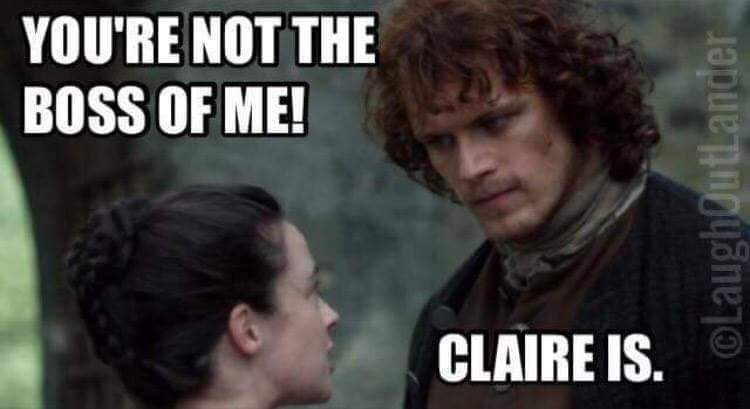
They may go the other direction as well to ramp up drama. In other words, a character may do something that he never would or inappropriate to the time period because the writer wants to heighten the drama or boost the visual. (Another pet peeve).
I could list many examples, but here’s just one: Lord John getting it on with Judge Alderdyce in Jocasta’s pantry. This was … just no. NO.
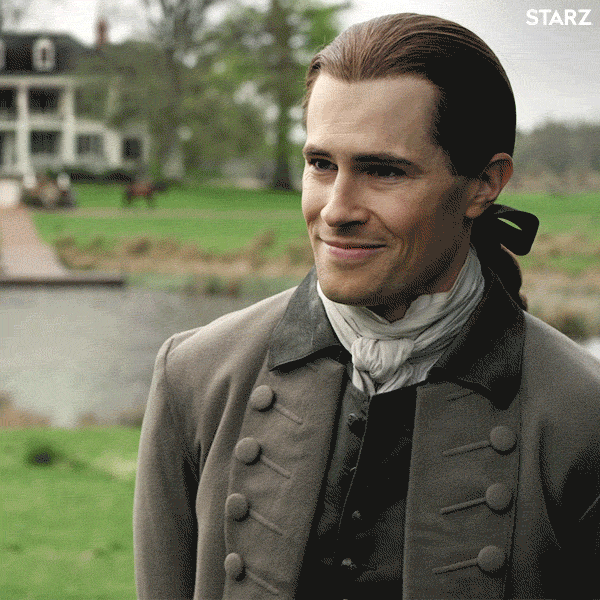
- Lord John would never be so indiscreet with a stranger who is also a Judge AND a fellow guest
- This is a scandalous crime in this time. He would never risk dishonor to a house where he is a guest, ESPECIALLY when his host is Jamie Fraser’s aunt.
- He is there at Jamie’s introduction. He would not risk their friendship and his family honor this way.
- And fourth, he is there to check on Jamie’s daughter, who is under the same roof.
Och weel… it was certainly visual and dramatic.
The Last Plane of Reflection
Remember the three-mirrored kaleidoscope Diana turns to create story? We discussed two mirrors so far — the historical reflection and the character’s reflection. The third reflection is her own. In her words, “the background, experiences, perceptions and personality that make me unique.” All three blend to create the intricate, layered patterns on the page.
We should do the same, but don’t let your own perspective block out the others. You can never truly appreciate historical fiction if you do.
Do you believe presentism gets in the way of people appreciating Outlander?








Great perspective analysis, Angela! The formula for DG’s success is her innate ability to not apply presentism in her writing. I can see where the show falters in this light. Thanks!
Thanks Lisa,
So glad you enjoyed the piece. Thanks so much for your support!
-Angela
TY for this. few days ago had posted on tumblr for exactly this one cannot judge past by today’s standards . As horrible anc horrific past is by today’s standard, that was how things were like the spanking Jamie gave Claire in season 1 1n reconing brutal abusive by todays standard but that was part of way of life in 18 th century women obeyed their husbands no ifs ands or buts . a d there were consequences for disobedience
Since a child I have always loved historical fiction and when I was introduced to Outlander by a friend before leaving on a trip to Scotland, I fell in love with the way DG writes. I spent the next few months reading the books, another few listening to Davina Porter read to me on my long commute and then watched the TV show. I tend to keep my book world and TV world separate. The books to me are masterpieces in historical fiction and they have prompted me to delve into Scottish history (my paternal grandfather was a Scot) and since I was born in 1954 have a good grasp on the 60’s and Brianna’s POV. I do though love the TV show and can understand how certain things are done for the TV world and let’s face it turning a 900 page book into 12 episodes must be a monumental task. I think because I have read the books, I am more accepting of the things I think others object to on screen (e.g., the spanking) and can put myself in the time period POV. This article was a wonderful explanation and discussion of the phenomenon of presentism; it has given me food for thought and one more reason to love the Outlander world!
Dear Phyllis,
Thank you! So glad you enjoyed the piece. Yes you are right. I think when you read the book first, you filter what you see on screen through what you have read, and react differently
-Angela H
As usual, I feel like you have read my mind and then made sense of it. DG created a time and space that I have lived in for many years. I guess that is why I get so furious with show deviations that destroy people I have loved for so long.
Dear Angel,
You got it Sassenach sister! I know what you mean. It was a big problem with Roger last season, both on the viewers and on the writers.
-Angela
Thank you, Angela. This is the first I’ve read about presentism. Fascinating phenomenon. Diana Galbadon’s Outlander books have provided intrigue, escape, & rescue to my sometimes weary mind. I believe that shelter would be less effective if modern norms were applied. It is best to let go & let the current of the story carry the reader with it.
Well said Dorothy, and thank you!
What a well written and presented examination of a term of which I had never heard! It is exactly as you explained it. The wonder is the quality of the glass and colors used in Diana’s kaleidoscope! I have found NO other author that comes close! Thank you!
What a beautiful visual, Shelley Laub! And so beautifully described.
exactly. the arrogance of the writers is appalling.
Once again, I totally agree with you! I have often thought about this when I see comments from fans who don’t like how a situation is portrayed, and there are many examples – you’ve cited some. I find it very annoying when they make judgements based on today’s norms. But I find it even more annoying when the screen writers change something from the books based on their personal, modern POV. Like Claire trying to save Rufus on the dining room table – it made her look very foolish, as opposed to in the book when she asks Jamie right at the Mill when they bring Rufus down from the hook, if he will be allowed to live if she saves him. When he answers no, she gives Rufus something to allow him to die peacefully. But the writers seem to want to make Claire appear super strong and unyielding- which I think in fact is less realistic and makes her character less likeable. I think too that some people who did not experience the 1960’s or 70’s don’t realize how difficult it was for women to assert their independence at that time. I could go on and on! Suffice to say- thanks so much for this post, Angela! Well done!
Dear Judy,
Thanks for taking the time to read and leave such a thoughtful comment. We need to keep reminding people because some just can’t get out of their own box. And yes, the show writers enable it more when they do that. Thank you, glad you enjoyed the piece!
-Angela
This!!! I love the Outlander series because DG works so hard to be historically accurate. I’ve dropped other book series because they have injected so much presentism it was unrealistic and very disappointing… Especially when the characters are historical figures! I actually learned the term quite a while back as a result. If authors can’t take the time to do their research, I have no interest in their books.
GREAT article!!
Brenda
Brenda,
Sometimes it’s not even the authors, it’s pressure from their publishers. I talked to a writer this week that is writing a book set in the Confederacy, and she is being pushed on what will be “acceptable today” in spots. She said reading my piece gave her a bit of refreshment. I told her to stand her ground, but that is easier said than done for an aspiring writer looking to break out.
Diana, on the other hand, has the clout now to tell someone to pound sand if she wants ?
Angela
Well done, Angela! The proof being how much food for thought you have given me. The biggest compliment I can give your post is to say that it makes me want to reread and apply it to situations, not just in Outlander but other books I’ve read as well.
In the first (wonderful) clip, Jamie’s makes the point that Claire’s words put her in danger – not just that they are unacceptable – they are “fighting words.” In fact he says more about how violent the response might be as the scene progresses. Its not just girls are weak and shouldn’t mess with men, violence can erupt from any offense given between anyone. Violence was – and in many cultures and parts of the world still is – part of a personal, daily fight for survival. Has it evolved, over time, into more horrific, wide-scale, national/global violence, even genocide, in the fight for supremacy? Yes, we have better tools with which to destroy each other and its easier to “roam” far and wide to do so. But even that larger effort started well before the world of OL and I would say that – from the perspective of presentism – it has always gotten worse with time, not better. These are things that Jamie and Claire reflect on separately and together, when they think and talk about “their wars.” Things Jamie and Hal explore, along with soldiers of every stripe throughout the books.
Something else you touch on is how the characters evolve in their attitudes and thinking throughout the books. THEY judge their own times and their behavior adapts when it can. When that’s not possible, they seek to understand why and take us on that journey with them.
While Diana may not judge her characters through the lens of present-ism, and ask us not to, all we have to do is keep reading. I have rarely met a group of people who so freely own their own flaws and mistakes, are harder on themselves, or are more willing to discuss morality, honor, right, wrong, sin, the possibility or improbabilities of redemption and forgiveness. I have often joked that every character, including Rollo and Clarence the mule, joins into these conversations throughout. Diana writes about life, in all of its beauty and ugliness. And no one in the books escapes the wages of sin, somehow or other, sooner or later.
As to judging history, I have to admit that I do, and I do judge the worst of individual human behavior. But I am compelled to read about the worst of it, then and now, know the people who lived it and still do, how they responded for better and worse. Slavery, the genocide of native people (they weren’t Americans when that started), it doesn’t get worse than that here. Showing the truth of it’s own judgement.
(I haven’t forgotten women, the books give a fascinating anthropological view into the development of roles of both sexes, fair’s fair, in Western culture…but I’ll just leave it at that. For now, LoL.)
Error in the crucial (to me!) I meant to say that the truth IS it’s own judgment.
Dear Diane,
Thanks for such a thoughtful reply! Yes… it’s a difficult thing at times, especially when it hits our own personal “hot buttons”
I thought of an analogy – I may share it on the main page. But think of all the things that are normal life today that may be abhorred 150 – 200 years from now.
Follow me here. Let’s say veganism becomes more and more prevalent over time.. Then science progression reveals all of these serious health hazards of meat, things we didn’t know before. Fifty more years go by and people get more “enlightened” and against using/consuming any animal product. So then, say in 75 years, eating or using animal products become outlawed, and people view those who did so illegally as backward, disgusting and uncouth. Now another 125 years pass where this belief and norm become embedded into the culture. Eating animal products is unheard of and barbaric. So then someone time travels back to 2019..I see them dazed walking along the road. I pull over trying to be helpful. I say, “let me get you some food.” Then I pull into Wendy’s and order us some burgers and fries.
Now, someone reading that 200 years from now is appalled. They see me as a disgusting barbarian … pushing some dangerous disgusting thing on their heroine. Ewwwww.
But to us, we are just being kind and trying to share a burger with a poor stranger. To us, this is normal. A kindness even. Am I terrible because in 200 years it will be viewed differently? No.
I see what you mean and can relate both of our references to your original post. It shouldn’t matter what is going on when someone is reading a book, what the current values and mores are – partly because they may differ wildly from place to place to time to individual. The only thing that matters is what each character does, thinks and feels – whenever and wherever they are. The setting in the book is “true” whether it happened that way or not because that is the world we are in while reading. If it was a futuristic fantasy novel, the same rules would apply. I’m thrilled by the detail Diana provides, but as you say, history can’t be trusted – put two historians in a room and they might come out with three contradictory reading of events.
Readers will always judge characters – remember when Tom Christie was telling Claire about the Ardsmuir prisoners arguing what this or that character in (was it Tom Jones?) What they didn’t say is that whatever the character did shouldn’t have been written. That was left to the book burners.
I wholeheartedly agree with you on every point of your well written article . The word presentism (thanks for the detailed definition) applies to some screen writers . It takes guts to adapt it in the way Diana wrote the books . The big debate about the spanking scene almost spoiled the enjoyment of the episode for me . Also the whole Geneva rape discussion really annoyed me . I do love your article and hope some complaining viewers will take it to heart .
It’s a shame the OL writers didn’t adhere to the way the books were written…OL loses much of its depth because too much PCorrectness, #MeToo and modern sensitivities were injected into the story thus changing the nature of the book and the characters. Jamie lost his humour, leadership and the rich dialogue that made him Jamie. Claire gained some of Jamie’s wisdom, ideas and actions making him weaker and giving her Bossy Superwoman status….sadly OL more resembles a ‘soapie’ with the wanting of little dramas..Bree slapping her father is a NoNo, Claire wandering in the jungle for so long reduced more important story input….no wonder S3 & 4 are not worthy of any awards…the end is in sight of what could have been a story/tv show that could have been watched and rewatched in the decades ahead ..just as Gone with the Wind, BenHur or Moses have longevity….
Angela
First of all congratulation on your first blog – your knowledge and depth of understanding of Diana’s novels are nothing short of amazing. Your piece is well written and thought out. Thank you. And I as a reader really do pay much attention to period accuracy .. I always look at this is a book of fiction, expected that the author has done her Due diligence, which I know Diana has done and just immense myself in the story.
You have brought up some very valid point that many non book fans should keep in mind when viewing this show. Because I am a 21st woman I don’t condone spanking a wife or child or anyone for the matter, when I first read that scene in the book – I just accepted that is just what happened in that time frame. I also see many people complaining about all the rape that happens in the books .. again something I feel was very common back in the 18th century. The one thing I, I don’t want to say I disagree with you, but as a 1940’s woman I always Claire was ahead of her time which is why I think she was even more challenged by 18th century ways – she lucked out with Jamie for he, most of the time, is a little more compassionate of her ways.
The once thing I pick up with the show especially in season 2 is how Terry Dresbach dressed Claire. The 1940’s very much influenced many of the clothing that Claire wore in the 18th century .. just look at that black and cream costume – it was designed after Christian Dior’s bar suit which was design after 18th century fashion a costume that bridge the past to future. So is how Claire is dressed especially in season 2 disregarding the period she is living in? I think Terry did this on purpose .. not to be disrespectful of the time period but to bring to our attention that Claire is and will always be a fish out of water. This talks more about Claire costumes : https://youtu.be/2rRrbnR_Vt8
Dear Donna,
Thank you for such a wonderful comment. I am so glad you enjoyed the piece. Yes I agree that Claire was modern for her time… I think she was always on the front edge and pushing it. I believe much of that is also due to her unusual life leading to Frank and her war time frontline nursing. She never fit a “typical mold” … However, she still has the influences of her time. And I definitely see certain small generational differences between Claire and Bree. I also think that Claire’s background and her nomadic life greatly prepared her to adjust to the 18th century life. Even life with her uncle studying different civilizations in various places around the world. She adapts a little easier to change I think than Bree does.
Claire is definitely a unique woman in many ways. However, I think sometimes people take her forward thinking aspect and move it further to believe she has the mind of a present day woman.
But I think that cause problems. I think that also happens because her POV is written in 1st person, which makes us want to merge her with ourselves a bit more. So, it’s easier to lose sight that she may be more modern than a typical 40s woman, but she still isn’t a 21st century woman.
I agree with Terry’s purposes. She is always an Outlander (especially during the Paris time lol)
– Angela
Oops that should have said .. do NOT pay
You have put into words, the things that are making me cringe watching the show at times, and it seemed to get worse in the second half of Season 3 and some in Season 4 as well. Presentism is definitely the definitive term. Your observation “They overplay Claire as the hero to reiterate the “strong woman” theme” is so on target, at least since Season 1.
Susan, yes, our characters in Paris came as a wee shock after what I felt promised in the first season. And they continue to give me a turn even though I keep thinking I am inured.
Dear Susan,
Glad you enjoyed the piece! Yes the “Super Woman Claire with sidekick Jamie” vibe on the show has been the thorn in many book reader’s side. On the bright side, I do think the powers that be (the PTB’s for short if you ever see me say that) are beginning to hear the backlash a bit re that topic. It hit it’s height in S2 and back half of S3, but it felt a bit more toned down in S4. Don’t get me wrong, it still showed here and there, but S2 was the worst. It really began in the Lallybroch episode of S1 with “mommy Claire” … but I digress ?
The PTB’s need to understand that Claire is already a strong woman as written, but she depends at times on Jamie’s strength and knowledge as well. They also have different strengths, and they each respect those in the other. That’s not a crime to show as is. It is SO well balanced in the books — It’s why we love this couple.
-Angela
Thank you for this wonderful, well written article! I had never heard the term presentism before but you hit the nail right on the head! I have been so frustrated by the show’s “cleansing” of things, like Jamie’s devout faith, (it makes me wonder what they will do when Roger wants to become a minister!) and coloring other things through a modern lense, especially this last season. It’s easier for me to ignore some of the fans anger over things happening in a not-PC-for-2019 way because my enjoyment and love of the books and show has nothing to do with their opinion (although discussion is always good!); while my enjoyment of the show very much has everything to do with whether the writers change our beloved characters too much or not. My husband and I have seen this happen in some other historical shows, as well, and it makes us sad. He hasn’t read the Outlander books yet, but he said if season 5 is as colored with modern agendas as season 4 was he will stop watching altogether.
Dear Diane,
Thank you for your comment. I too wonder how they will handle Roger as well as all of the spiritual tones and discussions that occur with two leading men coming from different strong spiritual belief learning to negotiate, relate and see each other’s POV. That is a big underbelly to the story and relationships. Then you bring in the much stricter old school Presbyterians (in contrast to Roger AND Jamie both). And then we blend in the Native American notions of spirituality AND top that off eventually with the Quakers. It will become much harder to avoid spiritual matters, if that is the intent.
– Angela
Yes we should critique the character based on 21st century norms but i find that it is perfectly to fine for some in the fandom to judge Frank, and Roger to apply 21st judgement too. They should be judged by their period in time. And to some it is perfectly fine to judge Claire period no matter what time period she is in. The only time the fandom has a meltdown is when some judge Jamie by 21st century attitudes. So to me its a bit hypocritical. Also in my opinion the show gets the time periods correct, it is in my opinion the fandom that needs to adjust their thinking.
Hi Angela –
This was a great article! It actually pinpoints why my two daughters and I have somewhat heated discussions regarding some of the scenes that are so non-21st century. They (especially the older daughter) tend to apply the standards of today against what was “appropriate” and acceptable in Jamie’s time. I have to keep reminding them that, in those days, men were permitted to “punish” their wives if they were disobedient, or how “outspoken” women were frowned upon and dismissed, even in the 60’s and 70’s.
To make allowances for oversensitive individuals who don’t take into consideration the time period of an historical novel sort of defeats the purpose of writing (televising) an historical novel, don’t you think?
Mary Lou,
Rather than take offense, people should see it as an opportunity to eduacate and understand. I find that happens so much as I read these books. It opens your mind to understand the shapes and contributing aspects to things about the past we may not like. It also shows how thinking slowly evolved and why.
If you just knee jerk react, you don’t allow understanding, enlightenment or learning.
All if this past, contributed to the shape of our present. Just as our present will contribute to the shape and changes made in the future.
(Try that one out on your girls ? )
– Angela
I enjoyed this article. It’s a very good read. Presentism is a factor in so many things.
Thank you Frances!
Excellent article! Human nature magnified through social media. There is darkness in the souls of all men (add in women) but without darkness there can be no light.
I hope in the end we are all redeemable. ?
Amen to that Jane! I say that to people all the time (even in a few comments here). There will be things you do/say today and view as completely “normal” that people will judge and condemn in 250 years. You would hope if someone looked at you personally, they would not judge your character by their 23rd century knowledge and perspective. We tend to think our own era is the epitome of enlightenment for all time.. Trust me, we will be outdone eventually and our norms obsolete.
Thanks for weighing in,
Angela
Excellent read! I can’t stand it when I read, or watch historical fiction, and the manners and ways of a time period are changed/presented to current norms. I like as much veracity as possible to historical fiction. I do enjoy this about the Outlander series.
Thanks Narda!
“History is another country, they do things differently there.”
Alan,
Bravo.. I like that. VERRA TRUE
Well stated. Nothing is more frustrating than having my moment in the story interrupted by someone voicing some disdain for a character in the story because they were not PC. I always remind them we (cause I fully immerse with the characters or at least try to) are in the 1700s. They seem surprised as if they had forgotten.
Brenda,
I think you are right about that, especially regarding the show. They know it, but don’t remember it in those moments (or don’t care lol)
Angela
I get lost in the books, have read each one countless times. my only hang-up seems to be “smell”/personal hygiene. I know silly. I keep trying to remember it’s what “they” are used to. but I can’t imagine making love to a man – even Jamie/Sam- who hadn’t had a bath and brushed his teeth, had been riding a horse for days, behaving like a bear in the woods without the benefit of Charmin, in a wool kilt that hadn’t been washed in forever….but it does snap me back to the present, and it’s annoying as hell. Claire only mentions what Murtaugh smells like when she first encounters him, and then after only refers to Jamie’s “musk”. Thanks for recognizing the Lord John gross error. Another of mine was Jamie taking a leak, and in the next scene touching Bree’s face with the same hand….we have to recognize how far we have come, and how far we still have to go. xo
Dear Konnie,
In those moments, you have to remember that Diana comes from the background of an animal behavior scientist. So not only are the smells, hygiene and responses part of period accuracy, a lack of belief in germ theory and logistical difficulties in the past… it’s also a fusion of her primal and scientific treatment of the characters as mammals in the way they process and relate. The animal world takes a lot of cues from smell, and as man has become more evolved and sophisticated with time, the need to rely on smells lessened. I think she aims to show those differences in just 250 years. You see that with Claire every time reenters a time. She feels the assault to her senses, but then her body begins to adjust and adapt to it as a norm, and she uses them to process and navigate. It’s quite a primal thing. Fascinating really, in a way.
Thanks for the great comment and taking a look at the article ?
-Angela
Thank you for the detail and thoughtfulness in this article. Have read and reread the books from pocket book to hard cover and enjoy each read because some other detail its revealed. Have watched the series and though in places it does deviate from the books have totally enjoyed each series. During this down time the discs are handy to watch again and as with the books there is always a new bit to enjoy. Thanks you to DG for the books and for the series. Have visited Scotland twice since my first read of Outlander and truly love the small but great country. Though I am happy to see more scenery from Scotland i do wish the horses, costumes and first nations could have been more 1700 American. Awaiting Series five with anticipation and know I will continue to be a strong fan of both the books and series.
I wanted to post a comment to those who took issue with the terms “politically correct” or “PC” … I have seen a few comments indicating that using the term says you are a racist, shortsighted or rude. I feel I need to speak to this as I don’t believe I am any of those (of course everyone is entitled to their own opinion).
As a matter of fact, I am more aware and sensitive to today’s norms against oppression BECAUSE I have been able to see the past in context with these books. They give me a depth of understanding I wouldn’t normally have had. I have come to appreciate the struggle and effort to take us from there to here, and it makes me treasure it more. The suffragettes. The Underground Railroad etc.
Regarding the use of “PC” .. you need to understand my background. I studied Communications/PR and my career launched late 80’s through 2000s. I came up through the heavy use of the term. It is a guide for people in my world to make sure all of communications are up to date with current terminology and norms of social acceptability..
This guide we keep constantly changes as the norms do. This has happened at a frantic rate these over the last 25 years as we’ve become more accepting of different groups as a society…. as we become more aware of underserved and oppressed audiences. Society evolves and things that are acceptable today will be no-no’s tomorrow. And we always want to strive to know what is currently offensive or unacceptable today, so we don’t offend people with our communications. We also need to show a bit of tolerance to people who just may not be aware of the “current” term.
However, the term “politically correct” always involves the PRESENT. It is inherent in the very word. And if we are speaking of the present, using the term politically correct is perfectly fine.
It’s only a correct term in the past if you are looking at what WAS politically correct at that time .. when IT was the present. What is PC today will be very different than what will be PC 100 years from now.
I am not condoning these behaviors. If this was a modern setting, I would be right on board condemning the characters by today’s PC norms.
This article is saying don’t judge characters based on OUR 2019 PC norms. It is not their present. Instead, we should try to see them through the politically correct norms of their time.
Just as we hope 250 years from now to be judged against what was politically correct for our time. Some of us will hit the mark. Some of us will be exceptional, even considered ahead of our time and forging new ground, and some will certainly fall short.
But I can almost guarantee that most if not all will fall short of what is “PC” 250 years from now. I would think we would all want to be judged by future generations by what the norms and politically correct behavior were today.
Thanks to everyone for your feedback. It’s been so encouraging to receive so much readership and interaction on my first Outlander Cast Blog post
-Angela
Really enjoyed this article and the way you presented the kaleidoscope theory. I think it also helps to explain why book readers tend to have such a different experience and reaction to the show than “show only” viewers.
I have always maintained that the two versions (book vs film or TV) must be appreciated separately/differently. The written word has so much more detail and has the time and space for extensive and descriptive character development.
And I totally agree that the TV show has suffered from “presentism”
And I sooooo agree with your comments about the Lord John scene!!!! I am a LJG fan and have read all the novellas. And the LJG I have come to know would never have behaved in such a furtive hasty way in the home of his hostess Jocasta.
It would be interesting to have this discussion with Dana and Matt Roberts.
Great read— thanks!!
Dear BMG,
Thanks so much for your terrific comment. I appreciate it 🙂
– Angela
Perfectly articulates my many concerns. The outrage over the spanking scene? Be outraged over the abuse that continues to occur today, not how something that was presented over 250 years ago, get over it, that was the time! Remove your nearsighted lenses. I love Diana Gabaldon’s detailed research, and her use of personal journals brings reality to the context. I enjoy the show, but cringe with many of the edits to the source material and the cleansing to make it more acceptable. Folks, if you want a truly comprehensive experience read the books! “Historic narrative” is controlled by the victors and offers a skewed perspective.
Thanks for teaching me a new word of the day, “presentism”; hadn’t been familiar with the term.
Dear Claudia,
So glad you enjoyed it … I can’t take credit for the word, but it certainly fits.
-Angela
Marvelous article – thank you for writing it! I appreciate your critisism about LJG’s tryst with the Judge in Jocasta’s pantry. I chalk it up to the difference between the book and the show, and reaching what I can the ‘sex scene quota’. First, the show has to get Brianna to the realization that John is gay much faster than the book, and therefore poetic license is allowed in screen writer’s mind. Could it have been accomplished in other, less obvious, ways? I think so. It wouldn’t be hard for us to believe that Bree could pick up, and draw conclusions, from subtle cues. Oh and secondly, sex!
Dear Jennifer,
Oh yes! I definitely could have thought of much better ways. To be honest, I would have written that whole section at Jocasta’s for that episode differently.
– Angela
Have not read all other comments, but I just want to thank you for this fine article. I am 6 months younger than Bree, so I can relate to her character as a young woman of the 60’s-70’s. I understand the difference between the feminist wave of that time and now, 50 yrs later. While I am white, I did witness the MLK, Malcom X and Black Panther era, and did the best I could to understand American racism. I am now being accused of being a fragile white woman who must be racist, and the young feminists aren’t much better. Presentism is pissing me off. It also is holding back the young people who think they must reinvent the wheel, and refuse to contextualize, and learn from those who have gone before. I will share this with many.
Yes! Yes! Yes! Excellent article. You have perfectly packaged the response to those who let presentism inhibit their immersion into the books. I have tagged on my phone to save my breath. Now I’ll just say “Here, read this.”?
As you pointed out we all evolve in our perceptions in our own time, understanding our beloved character’s time reference is just another layer of learning and knowing for us all.
Thank u!
Dear Regina,
Thank You! and please feel free to share as much as you like!
Angela
This was an awesome read, Angela. Thank you for sharing it with us.
Yes, I enjoy historical fiction a lot. And yes, there’s much that is disturbing. But isn’t that kind of the point? To present something accurately.
Unfortunately, I feel that Outlander (especially in these past couple of seasons) has taken Claire’s character and made her too much of the “superwoman”.
I feel that as a woman of the 1940’s she would have that mindset. Yes, she was way ahead of her time, yes, Frank and Jamie were quite attracted to her mindset and strength of character.
Yet, wouldn’t she still have something of the 1940’s mindset? Especially in her dynamics with Bree?
What I mean is, wouldn’t we see the differences or at least a generation gap between the two women?
For example, Bree as a woman of the late 1960s would have all kinds of ideas regarding the changing role of everyone in society–Yet in River Run in Season 4, Bree had no feelings about Jocasta owning slaves at all.
Claire, on the other hand, was incensed.
It just didn’t ring true to me. I would have thought the outrage should have been much more Bree’s: after all the 1960s were very much an uprising for so many.
The “spanking scene” in Season 1, but then so was the scene where the child had his ear nailed to the pillory.
Yet both were authentic to the time period (chimney sweeps were children after all)
I guess what I’m saying is, that I would like the characters to be a little more authentic to their time.
I had a huge problem with Roger doing a complete 180 from the character we knew him to be in previous seasons, and don’t get me started on Lord John’s sex scene!
Anyway, thanks for sharing.
I think these are interesting questions, Dawn. I’m not sure where superwoman show-Claire would have fit in history! Certainly not in a time period in which she was trying to avoid being burned as a witch. It isn’t just superwoman, one of her hallmarks – as written – is her adaptability. Yes, she’s stubborn and outspoken, but she has better…idk…emotional intelligence? Maybe just her wry sense of humor, not about slavery of course.
Lord John sex was so wrong – I mean in the pantry!!? (And it didn’t even look like they were enjoying themselves, bad choice for a site that’s supposed to have the best sex on television.)
Claire’s mindset makes sense to me in the books because she grew up traveling the world, living in those very primitive conditions at times. Then, with very little break in between, to get married, she went almost straight into WW11. She may have known what the norms of the time were – we saw that she was looking forward to the mother, homemaker, professors wife role when we first met her with Frank. But she hadn’t lived it long enough to be stamped with the norms of the time – most of Britain would have been trying to find them again. By the time she goes back to the future, she has been through at least couple of universes, and she clearly chafed at the traditional role. By the time we meet Bree, I wouldn’t call Claire a flower child but she’d always marched to the beat of her own drum. And not shy to say so – like at River Run.
I wondered about Bree and slavery as well. When she went to stay at RR, pregnant, I wonder if she had just had so many severe shocks, and was such a wreck, that the comfort of Jocasta’s welcome and the comforts of the house were too much of a balm to fight, so she used her manners as well as possible and became close to her aunt, more of the family it meant so much to her to gain. I also think Jamie and Claire must have talked about it with her, she was there with Jamie when she arrived.
The thing I was curious about Bree (book and show) was how easily she acclimated to 18C life and work. Frank had taught her woods skills, but her lifestyle background was nothing like Claire’s, she had lived in the same very comfortable house since she was born (with no complaint from me lol!) But then I decided it was her eminent practically that made it work. She tends to see whatever us in front of her as a puzzle to be solved. Frontier life no exception.
I shouldn’t leave out Roger. I don’t know about his accommodation of slavery, but after the months on Bonnet’s ship, the months with the Mohawk, and making his way between, he would have been pretty inured to hardship. The show needs to make up for how they drew Roger last season – straight in Ep 1! And I hope they don’t make him into a wimp after what he survived. ?
In my above post, I meant to say the “spanking scene ” was disturbing.
I missed some thoughts there.
Ah, you make some interesting points yourself.
Yes, I thought it was very strange the way Bee adapted so easily to 18c life too.
As you say, Claire’s background was very much more nomadic than Bree’s.
And you made some great points about Roger! Boy, for a man who really enjoyed the television, he seemed to just take to the hardships of the 18th century.
I thought with both Bree and Roger having a background in history, that they really could have utilized their knowledge to their advantages. Yet, we’ve basically got nothing.
That scene with Roger and the priest comes to mind–I would have thought being raised by Rev Wakefield that Roger would have a whole bag of knowledge and feeling to give the priest. Instead, we heard none of that.
When Claire mentioned George Washington to Bree, she nearly yawned at the name.
Hopefully we’ll get some more authenticity to the characters as we know them this season.
I’m with you going, Dawn! I’m not sure we’ll get more authenticity in the characters dealing with the settings, but I am hoping for more in their identities and relationships wherever we find them. ?
Well said Angela. I truly enjoyed reading this article too. Thank you. I am a Language Arts teacher and my husband is a social studies teacher and we both LOVE Diana’s work. My husband loves it because of the historical accuracy and the historical part of the kaleidoscope. I love it for the character part of the kaleidoscope. It’s incredible how much I care about these fictional characters because they are brought to life for us through the honest representation you mentioned. I somewhat understand the need to change things based on ratings for the show, but given more time, staying more true to Diana’s story is what would make the non book readers fall in love too. I really like the perspective you have on presentism and not forcing modern thoughts and views on a setting taking place more than 200 years ago. Taking the leap back in time and enjoying the story for the period when it takes place is a true escape. Not bringing our modern selves into it makes for a better experience. Diana also paints master piece after master piece with her words, appealing to our senses and bringing the setting to life. Diana’s writing goes even deeper for me. Whenever I teach what I call, “soul level writing” to my students I have some of Diana’s work in mind. How do you portray those basic needs of one’s soul in a character? Knowing his values, perspective, and current situation brings this out. How do you do it without telling the audience but instead showing it? Number one is staying true to the character’s own belief system, values, and at times cultural norms. I love that you connect the writing to time period and Diana being true to character and time. Agreed! It’s what brings the characters to life and makes them human. Without it, you basically have a puppet show. (Nothing against puppet shows) You have blogged another well written piece I truly enjoyed reading. Love the graphics here too. No wonder Diana let you interview her. Great work! I also read parts to my husband who said,”That is what I try to get across to my kids, you can’t expect historical figures to share our beliefs. Cultural norms and values change all the time.” Thanks again for the good read and I intend to read the other posts I see here.
Dear Traci,
What a beautiful bit of feedback here! Thank you. I am sorry I am just getting to reply. You sound like an incredibly gifted teacher. Your students are lucky to have you! I love that your husband enjoys the show as well. If your husband teaches social studies, you should show him this piece. He would probably really enjoy it. (It’s in his ballbark).
Angela – thank you so much for this article! This is the second time I have returned to read it through and I have sent it on to book reader friends. You really ( and TRULY!) have captured the core essence of “presentism” in this bullet piece ( I am sure others have spent chapters and chapters on it!). Kudos to you for being able to articulate this so succinctly!!
I see that you are an active participant in Blake’s book club. If he decides to do a Voyager BCC, presentism should be front and center during the discussion of Brianna’s pregnancy and its related options within the historical time period, as you briefly mention above.
Dear Moe,
Thanks for the great feedback. I am glad people are coming back to read this one. It’s a good reminder as we head into the new season. Yes Blake’s Book Club is an adventure. Lol. I try to leave some interesting tidbits on each one. I miss them now that he is on vacation. Maybe he got a few “chaptahs” in while he was cruisin’
– Angela
Thanks so much for this perspective!
Angela
Historical fiction has been my favorite genre ever since I started reading on my own for the joy of it in third grade (King Arthur and the Knights of the Round Table ). I never before heard the term “presentism,” but knew what it meant as soon as I saw it here in the context of HF. I think we all struggle with it a bit when reading HF.
I agree with everything you wrote here. To answer your final question, yes, I think even the most enlightened reader will find involuntary presentistic (I think I just made up that word) resistance rising in her thoughts and emotions while reading HF – including Outlander. But being aware of it can keep us from being distracted from what we’re reading. I appreciate that Diana doesn’t shy away from accurately reflecting the customs and values of the era(s) in which she sets her stories.
Angela, you write with great clarity and heart, and your examples are well chosen. I enjoyed reading this verra much, indeed.
Thank you.
Dear Carlotta,
Thank you so much for your wonderful comment. I know what you mean. Everyone brings their own values and norms to what they read. I mean, that is completely expected, and it’s why the same show or book resonates with everyone differently. My experience will shade my perspective. But that should only be one aspect of the way you process. I think the problem occurs when it becomes the only aspect. And yes, awareness is a big part. I even catch myself and have to step back a wee bit.
Marvelous well thought out and well executed essay. May this be around for a long time to help readers delve in to Diana’s books. On point two, taking account of when the author is writing: I have long thought that if Diana were writing her Mr Willoughby character even just 1 or two decades later in time, he would be a less stereotyped character. The film makers writing script about 4 decades after the original work, changed him considerably. He becomes taller, rather handsome a rather sympathetic character – not at all characterized rolley- poly being whom you could picture riding all way from China in a barrel.
It’s not often that we come across content that really resonates with us, but this one is a standout. From the writing to the visuals, everything is simply wonderful.
Your writing is so powerful and has the ability to make a real difference in people’s lives Keep using your voice to spread kindness and positivity
This post is jam-packed with valuable information and I appreciate how well-organized and easy to follow it is Great job!
Every time I read a new post, I feel like I’ve learned something valuable or gained a new perspective. Thank you for consistently putting out such great content!
I love how this blog celebrates diversity and inclusivity It’s a reminder that we are all unique and should embrace our differences
Your posts are so well-written and eloquent It’s impossible not to be moved by your words Keep using your voice to spread positivity
Your blog has become my go-to source for positive and uplifting content Thank you for consistently delivering high-quality posts